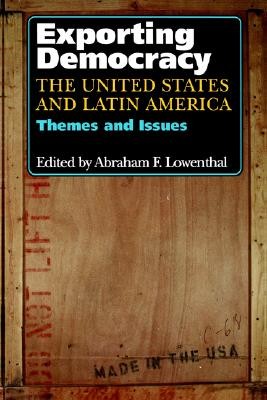| Exporting Democracy: The United States and Latin America Themes and Issu Edition Contributor(s): Lowenthal, Abraham F. (Editor) |
|
 |
ISBN: 0801841321 ISBN-13: 9780801841323 Publisher: Johns Hopkins University Press OUR PRICE: $31.35 Product Type: Paperback - Other Formats Published: October 1999 Annotation: The idea that the United States can and should help Latin America achieve democracy has been a recurrent theme in U.S. foreign policy throughout the twentieth century. By the 1990s, it had become virtually unchallenged doctrine, broadly supported on a bipartisan basis. Yet no systematic and comparative study of U.S. attempts to promote Latin American democracy has ever been published -- and the policy community often seems unaware of this history. In "Exporting Democracy," Abraham F. Lowenthal and fourteen other noted scholars from the United States, Latin America, and Europe explore the motives, methods, and results of U.S. efforts to nurture Latin American democracy. Contributors focus on four periods when such efforts were most intense: the years from World War I to the Great Depression, the period immediately following World War II, the 1960s, and the Reagan years. The book tells a cautionary tale -- revealing that U.S. efforts to export democracy in the Americas have met with little enduring success and often have had counterproductive effects. "Exporting Democracy" is available in two paperback volumes, each introduced by Abraham Lowenthal and organized for convenient course use. In the first paperback volume, "Themes and Issues," contributors and their topics are Paul W. Drake, From Good Men to Good Neighbors: 1912-1932; Leslie Bethell, From the Second World War to the Cold War: 1944-1954; Tony Smith, the Alliance for Progress: The 1960s; Thomas Carothers:, The Reagan Years: The 1980s; Elizabeth A. Cobbs, U.S. Business: Self-Interest and Neutrality; Paul G. Buchanan, The Impact of U.S. Labor; John Sheahan, Economic Forces and U.S. Policies; Laurence Whitehead, TheImposition of Democracy; Abraham F. Lowenthal, The United States and Latin American Democracy: Learning from History. In the second paperback volume, "Case Studies," the contributors and their topics are: Carlos Escude, Argentina: The Costs of Contradiction; Heraldo Munoz, Chile: The Limits of "Success"; Jonathan Hartlyn, The Dominican Republic: The Legacy of Intermittent Engagement; Lorenzo Meyer, Mexico: The Exception and the Rule; Joseph Tulchin and Knut Walter, Nicaragua: The Limits of Intervention; Elizabeth A. Cobbs, U.S. Business: Self-Interest and Neutrality; Paul G. Buchanan, The Impact of U.S. Labor; John Sheahan, Economic Forces and U.S. Policies; Laurence Whitehead, The Imposition of Democracy; Abraham F. Lowenthal, The United States and Latin American Democracy: Learning from History. |
| Additional Information |
| BISAC Categories: - Political Science | International Relations - General |
| Dewey: 327.730 |
| LCCN: 90024061 |
| Physical Information: 0.78" H x 6.06" W x 9.22" (1 lbs) 288 pages |
| Descriptions, Reviews, Etc. |
| Publisher Description: The idea that the United States can and should help Latin America achieve democracy has been a recurrent theme in U.S. foreign policy throughout the twentieth century. By the 1990s, it had become virtually unchallenged doctrine, broadly supported on a bipartisan basis. Yet no systematic and comparative study of U.S. attempts to promote Latin American democracy has ever been published -- and the policy community often seems unaware of this history. In Exporting Democracy, Abraham F. Lowenthal and fourteen other noted scholars from the United States, Latin America, and Europe explore the motives, methods, and results of U.S. efforts to nurture Latin American democracy. Contributors focus on four periods when such efforts were most intense: the years from World War I to the Great Depression, the period immediately following World War II, the 1960s, and the Reagan years. The book tells a cautionary tale -- revealing that U.S. efforts to export democracy in the Americas have met with little enduring success and often have had counterproductive effects. Exporting Democracy is available in two paperback volumes, each introduced by Abraham Lowenthal and organized for convenient course use. In the first paperback volume, Themes and Issues, contributors and their topics are Paul W. Drake, From Good Men to Good Neighbors: 1912-1932; Leslie Bethell, From the Second World War to the Cold War: 1944-1954; Tony Smith, the Alliance for Progress: The 1960s; Thomas Carothers:, The Reagan Years: The 1980s; Elizabeth A. Cobbs, U.S. Business: Self-Interest and Neutrality; Paul G. Buchanan, The Impact of U.S. Labor; John Sheahan, Economic Forces and U.S. Policies; Laurence Whitehead, The Imposition of Democracy; Abraham F. Lowenthal, The United States and Latin American Democracy: Learning from History. In the second paperback volume, Case Studies, the contributors and their topics are: Carlos Escude, Argentina: The Costs of Contradiction; Heraldo Munoz, Chile: The Limits of "Success"; Jonathan Hartlyn, The Dominican Republic: The Legacy of Intermittent Engagement; Lorenzo Meyer, Mexico: The Exception and the Rule; Joseph Tulchin and Knut Walter, Nicaragua: The Limits of Intervention; Elizabeth A. Cobbs, U.S. Business: Self-Interest and Neutrality; Paul G. Buchanan, The Impact of U.S. Labor; John Sheahan, Economic Forces and U.S. Policies; Laurence Whitehead, The Imposition of Democracy; Abraham F. Lowenthal, The United States and Latin American Democracy: Learning from History. |
Contributor Bio(s): Lowenthal, Abraham F.: - Abraham F. Lowenthal directs the Center for International Studies at the University of Southern California. His books include Partners in Conflict: The United States and Latin America in the 1990s, revised edition. |